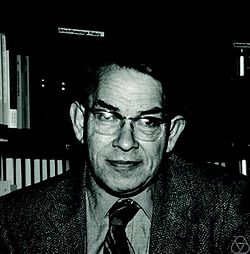Walter Hayman facts for kids
Quick facts for kids
Walter Hayman
|
|
|---|---|
 |
|
| Born |
Walter Kurt Hayman
6 January 1926 Cologne, Germany
|
| Died | 1 January 2020 (aged 93) |
| Nationality | British |
| Education | University of Cambridge |
| Known for | Theory of subharmonic functions Univalent function theory |
| Spouse(s) | Margaret Hayman (née Crann) |
| Awards | Berwick Prize (1955) Senior Berwick Prize (1964) De Morgan Medal (1995) |
| Scientific career | |
| Fields | Complex analysis |
| Institutions | King's College, Newcastle University of Exeter Imperial College |
Walter Kurt Hayman (born January 6, 1926, died January 1, 2020) was a brilliant British mathematician. He was especially known for his work in a special area of math called complex analysis. This field deals with numbers that are more complex than the ones we usually use. He also taught as a professor at Imperial College London.
Early Life and Education
Walter Hayman was born in Cologne, Germany. His father, Franz Haymann, was a professor who studied Roman law. His mother, Ruth Therese Hensel, was the daughter of a famous mathematician named Kurt Hensel. Walter was also a great-grandson of the well-known composer Fanny Mendelssohn.
Because his family was Jewish, Walter had to leave Germany in 1938. At that time, the Nazis were in power, and it was not safe for Jewish people. He traveled alone by train to England. He continued his schooling at Gordonstoun School. Later, he studied at St John's College, Cambridge, where he learned from famous mathematicians like John Edensor Littlewood and Mary Cartwright. After finishing his studies, he taught at Newcastle University and the University of Exeter.
Family and Contributions
In 1947, Walter Hayman married Margaret Riley Crann. Together, they did something very important for young math students in the UK. They helped create the British Mathematical Olympiad. This is a competition that challenges talented young mathematicians.
Walter Hayman was known for his important ideas in complex analysis. He made big discoveries related to the Bieberbach conjecture in 1955. He also developed "Hayman's alternatives" in something called Nevanlinna Theory. His work helped solve a difficult problem in this theory, even before other mathematicians did.
Awards and Recognition
Walter Hayman received many honors for his amazing work in mathematics. In 1956, he became a member of The Royal Society, which is a very old and respected group of scientists in the UK. He also became a member of the Finnish Academy of Science and Letters in 1978. In 1985, he was made a "Foreign member" of the Accademia dei Lincei in Italy.
In 1992, Uppsala University in Sweden gave him an honorary doctorate. This is a special degree given to people who have achieved great things. In 1995, he received the De Morgan Medal from the London Mathematical Society. This is one of the highest awards for mathematicians in the UK. In 2008, a special issue of a math journal was dedicated to him to celebrate his 80th birthday.
Images for kids
 | Dorothy Vaughan |
 | Charles Henry Turner |
 | Hildrus Poindexter |
 | Henry Cecil McBay |


